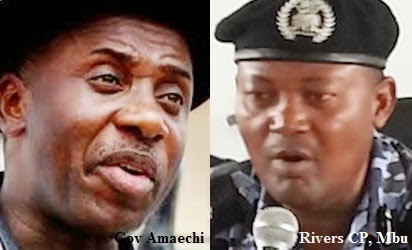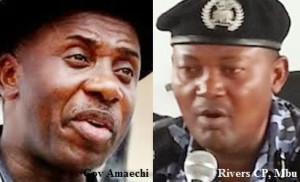Opinion: Compromising Policing in Rivers
Articles/Opinion, News Features/Analysis Saturday, January 11th, 2014
By Adewale Kupoluyi
Policing is a serious business. Effective policing is a constitutionally requirement in any democratic government, in terms of securing the lives of the people and maintenance of law and order. This sacred duty seems to have been compromised on the altar of sheer politics in Rivers State.
 The political imbroglio in state became more worrisome with the bombing of a state High Court at Ahoada, in Ahoada East Local Government Area, while another high court in Okehi was also razed down. The upheaval between the political stakeholders in the state has continued to take its toll on the smooth functioning of the three arms of government. And at the end of the day, it is the people that suffer and get polarized along ethnic and political party lines.
The political imbroglio in state became more worrisome with the bombing of a state High Court at Ahoada, in Ahoada East Local Government Area, while another high court in Okehi was also razed down. The upheaval between the political stakeholders in the state has continued to take its toll on the smooth functioning of the three arms of government. And at the end of the day, it is the people that suffer and get polarized along ethnic and political party lines.
Ordinarily, one may not be too interested in the ongoing party intrigues and political scheming, what is of utmost importance is the aftermath in terms of lawlessness, neglect of governance and resultant bad image bequeathed to the nation. It further raises the question: why would the inability of our law enforcement agents constitute a drainpipe on the tax payers’ money by failing to perform their statutory duties? It is for these reasons that those concerned should be called to order without delay.
The Rivers State Governor, Chubuike Rotimi Amaechi, being the Chief Security Officer of the state has a constitutional obligation to his people to maintain law and order. Section 215(4) of the Nigerian Constitution as amended, empowers a state governor to give lawful directives to the Commissioner of Police in the State with respect to the maintenance and securing of public safety within the state as he may deem necessary. It is on the basis of this argument that Amaechi’s accusation of bias against the police commissioner, Joseph Mbu, could be established.
A few examples will suffice. First, is the lopsidedness of Mbu in the handling of the illegal attempt by Evans Bipi, who led a group of five lawmakers opposed to Governor Amaechi, to take-over the assembly from Otelemaba Dan-Amachree, the real Speaker of the assembly.This power tussle culminated into complete lawlessness and the intervention of the National Assembly, which passed a resolution to take-over the affairs of the house, which was eventually dismissed as illegal by an Abuja High Court.
Following the court judgment, Mbu, rather than ensuring the enforcement the court’s decision, initially feign ignorance of the judgment but after much pressure, later asked the lawmakers to sign an undertaking to be of good behaviour before they could be allowed to resume. Inspite of this, the police command was not satisfied with the signing of the undertaking as it warned the lawmakers to steer clear of the building housing the state legislature. The police had hinged its volte-face on another pending application before a Court of Appeal, for a stay of execution on the decision of the Federal High Court in Abuja, leading to the deployment of armed policemen, who released bursts of tear gas canisters to disperse and chase away Amaechi’s supporters, in a humiliating manner.
Secondly, the governor gave another instance whereby the police commissioner compromised the regular Security Council meetings, leading to reluctance on the part of members to contribute meaningfully, thereby leaving out salient security issues for discussion. What it means is that no proactive security measures and plans are ever put in place. The offshoot of this laxity certainly amounts to doing nothing to tame criminality and lawlessness.
Amaechi had also cried-out that his life was a stake when Mbu unilaterally withdrawn the police security attached to him and other principal officers of the state, without any prior notice or justification. The governor said this withdrawal was a calculated ploy at paving the way for him to be attacked. As if that was not enough, Mbu was accused of unilaterally terminating the joint police-army patrol, which had been used as a formidable strategy to checkmate violent crimes of kidnapping, rape, armed robbery and car-snatching in the state.
Again, the governor had accused Mbu of taking sides with the Felix Obuah-led faction of the Peoples Democratic Party in the state by refusing to obey court orders that are unfavourable to the faction, such as the continued occupation of the Obio/Akpor Local Government secretariat. Just a few days back, the state house of assembly in a strange legislative manner, moved into a ‘makeshift chamber’ within the Government House, to pass the 2014 budget of N490.32bn for the current fiscal year!
Without mincing words, it should declared that the increasingly and frequent engagement of law enforcement officers in purely, partisan and political squabbles portends serious danger for the polity. Not only would such posturing further erode the neutrality of the police, it could well compromise the entire force as an ineffective and lame-duck agency of the government in the eyes of the public, which the unfolding drama in Rivers State shows.
The Human Rights Writers Association of Nigeria’s report had accused the Nigerian police of ‘incessant interference in the affairs of politicians’, indulging in unpleasant human rights abuses, arbitrary arrests, torture, extrajudicial killings, corruption and extortion, among others. This is disheartening and at variance with the Police Act, which clearly outlines the functions of the police by maintaining law and order in a non-partisan manner.
No doubt, the country’s policemen daily face political and constitutional dilemma due to the constitutional provisions, which currently place the control of the police within the ambit of an elected executive president, who happens to be the leader of his political party by virtue of Section 215 of the constitution still accords the Nigerian President – acting on the advice of the Nigeria Police Council, to appoint the Inspector General of Police – who gives direct instructions to the state commissioners without much loyalty to the governor of a state.
This experience has been the basis for the continued agitation for state police in the nation. The prevailing situation in Rivers State has contributed in no small measure to the passage of a resolution by the National Assembly and the persistent call by Amaechi that the Police Service Commission should urgently redeploy the controversial police commissioner – whom he referred to as ‘a PDP member’ – from the state.
In the final analysis, police authorities should rise to the challenge of resisting the pressure to be used as punitive and repressive tool by the ruling political party. They should be made to know that they are not meant to serve a particular political party in power or the transient functionaries that appoint them into office. Rather, they owe their service to every citizen of the nation, irrespective of gender, religion, ethnicity or belief. The relationship between the police and elected public officers should clearly be in conformity with the tenets of the rule of law. This should be the new mantra of officers and men of the Nigeria Police Force.
Kupoluyi writes from the Federal University of Agriculture, Abeokuta, vide, adewalekupoluyi@yahoo.co.uk, Twitter, @AdewaleKupoluyi
Related Posts
Short URL: https://www.africanexaminer.com/?p=7142






















